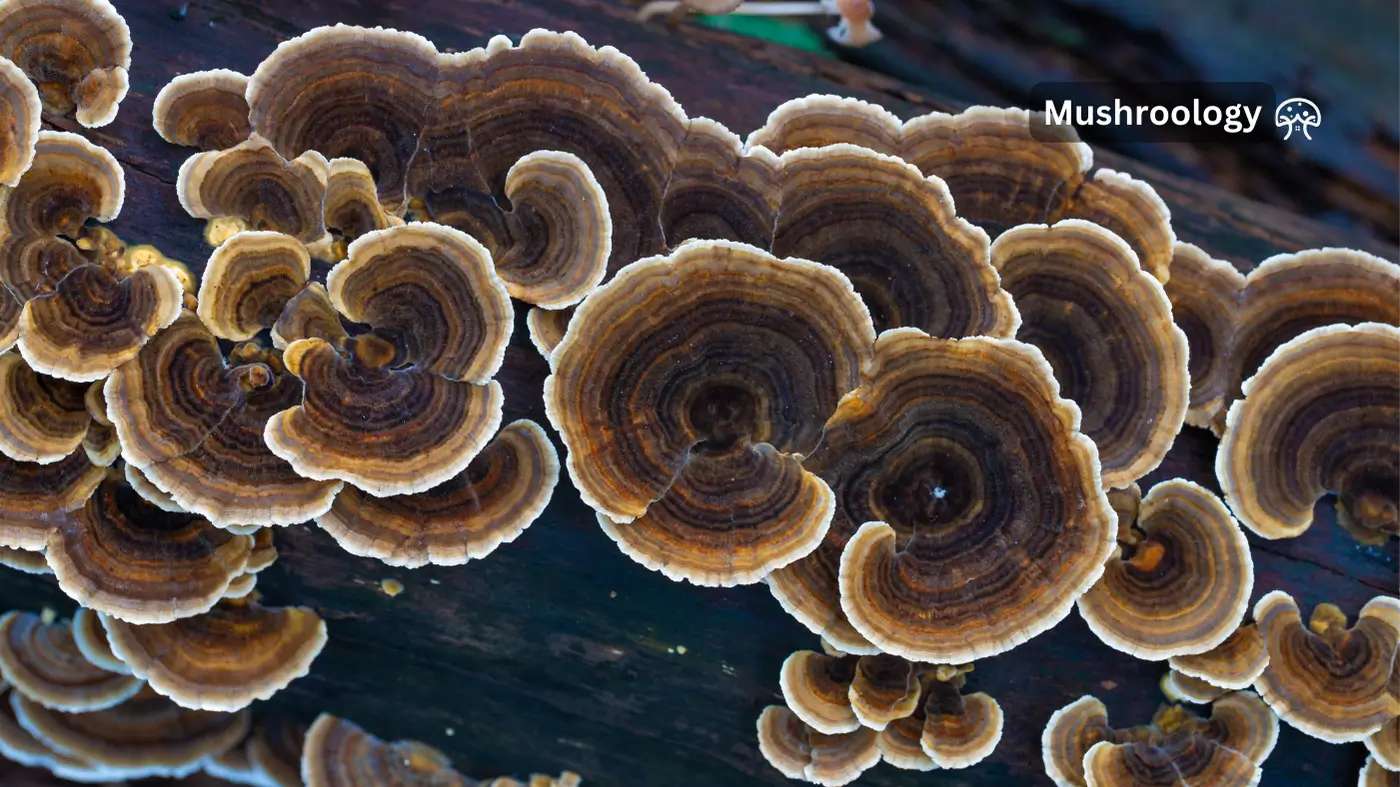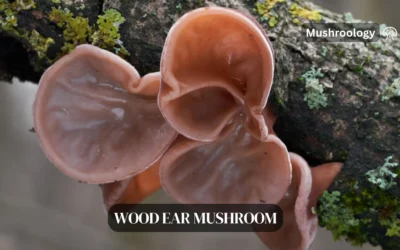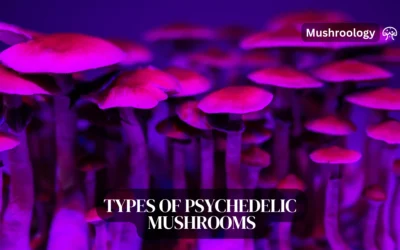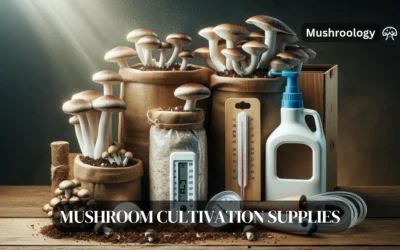Your complete guide to Trametes versicolor health benefits, backed by clinical research
You’ve probably heard about Turkey tail mushrooms supporting cancer treatment and immune health. But what does current science actually prove? After reviewing thousands of studies, researchers have identified specific compounds in Turkey tail (Trametes versicolor) that show measurable health benefits, particularly for immune function and gut health.
Bottom Line: Clinical studies show Turkey tail mushroom’s PSK and PSP compounds can support cancer treatment outcomes when used alongside conventional therapy. Research also confirms prebiotic benefits for gut health and immune system modulation, but you shouldn’t use Turkey tail as a replacement for medical treatment.
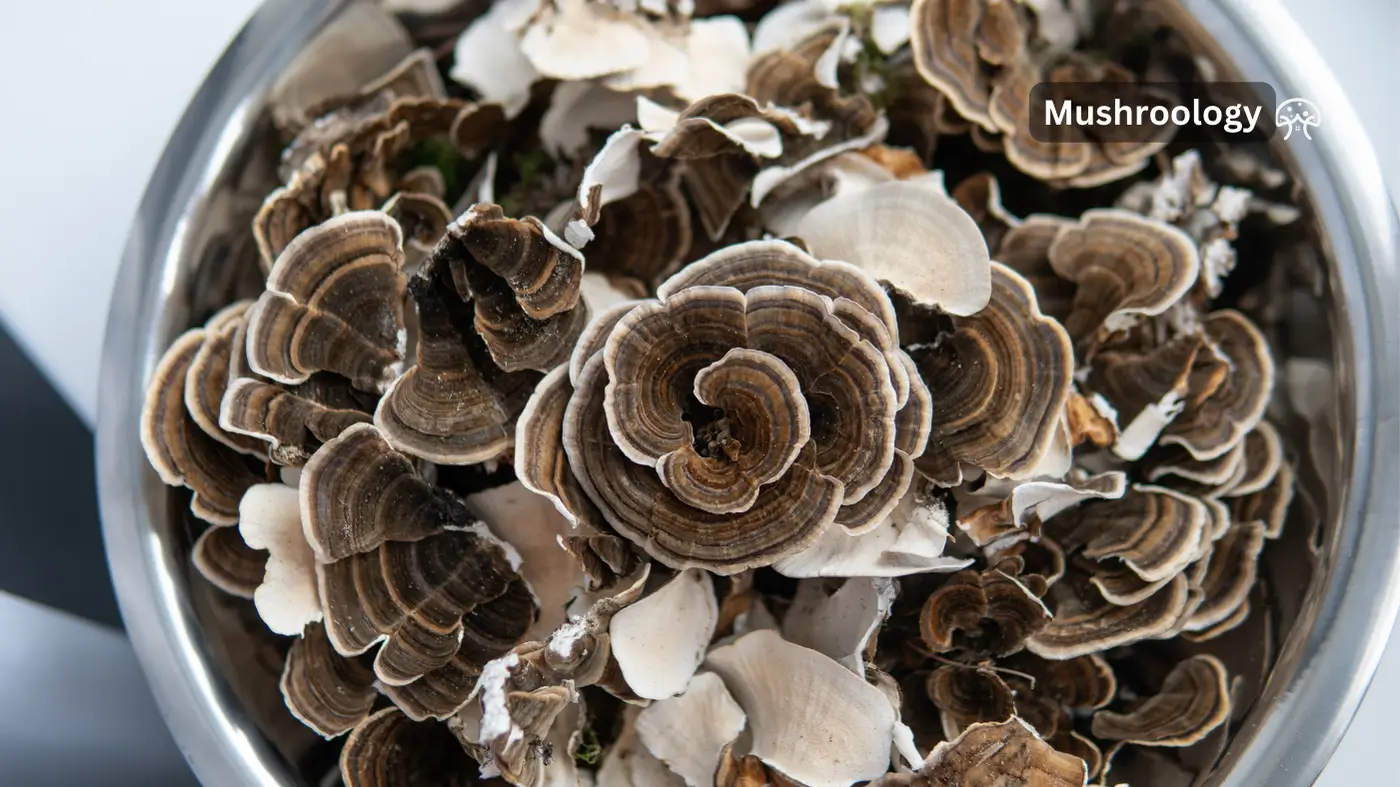
What makes Turkey tail mushroom benefits unique
Turkey tail mushrooms contain two scientifically validated compounds that set them apart from other medicinal fungi. Polysaccharide-K (PSK) and polysaccharide peptide (PSP) have been studied in over 400 clinical trials since the 1970s.
According to the National Cancer Institute, PSK is approved as an anticancer drug in Japan and has been used as adjuvant therapy in thousands of cancer patients since the mid-1970s. This makes Turkey tail one of the most researched medicinal mushrooms in the world.
The mushroom’s fan-shaped appearance resembles a turkey’s tail, hence the name. In traditional Chinese medicine, it’s called Yun Zhi (cloud mushroom), while Japanese practitioners know it as kawaratake. These colorful brackets grow on dead hardwood trees throughout North America and are among the most common mushrooms you’ll find in forests.
Key bioactive compounds:
- PSK (polysaccharide-K or krestin): 100 kDa protein-bound polysaccharide
- PSP (polysaccharide peptide): Similar structure, different protein composition
- Beta-glucans: Immune-modulating polysaccharides
- Phenolic compounds: Over 35 different antioxidant molecules
How Turkey tail mushroom benefits your immune system
Turkey tail mushrooms work as immune modulators, meaning they help balance rather than simply boost immune function. Clinical research published in 2024 shows these mushrooms can increase cancer-fighting cells in the immune system.
The mechanism involves specific recognition of beta-glucans by immune receptors in your digestive tract. When these receptors detect Turkey tail’s unique polysaccharides, they trigger increased surveillance and antibody production against harmful pathogens.
Proven immune benefits:
- Increased natural killer (NK) cell activity
- Enhanced T-cell and B-cell function
- Improved white blood cell counts during treatment
- Better recovery of immune function after radiation therapy
A 2012 clinical trial found breast cancer patients taking Turkey tail capsules recovered immune function after radiation therapy more quickly than those who didn’t. UCLA Health research confirms Turkey tail acts as a nonspecific immune modulator, supporting overall immune system balance.
Turkey tail mushroom benefits for cancer support
Turkey tail shows the strongest scientific evidence for supporting conventional cancer treatment. Six randomized clinical trials in lung cancer patients found that those receiving PSK improved in immune function, body weight, well-being, and survival outcomes.
Cancer types with research support:
- Gastric cancer: PSK improved survival when added to chemotherapy
- Colorectal cancer: Better 10-year survival rates with PSK plus standard treatment
- Lung cancer: Enhanced immune function and quality of life
- Breast cancer: Faster immune recovery after radiation therapy
Recent 2024 analysis shows modest evidence for better survival among cancer patients when Turkey tail is used alongside conventional treatment. However, Turkey tail extract doesn’t treat cancer on its own – it works as a complementary therapy under medical supervision.
Important: The FDA hasn’t approved Turkey tail for cancer treatment in the United States. In Japan, PSK is prescription medication used with chemotherapy, not a replacement for conventional treatment.
Safety Warning
- Turkey tail supplements can’t replace cancer treatment medications
- Always consult your oncologist before using Turkey tail during cancer therapy
- Some compounds may interact with chemotherapy drugs like cyclophosphamide and tamoxifen
- The North American Mycological Association emphasizes medical supervision for therapeutic mushroom use
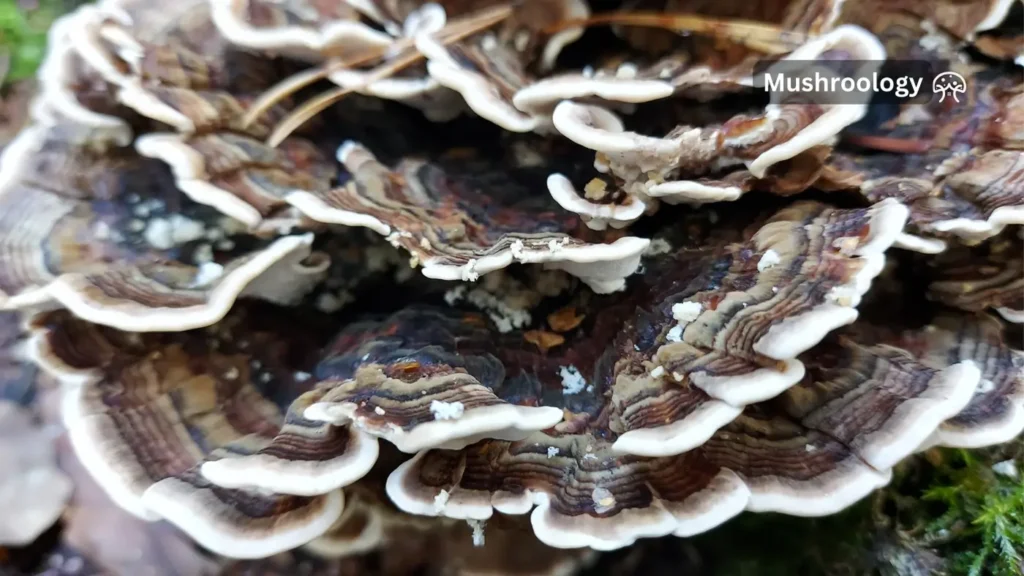
Turkey tail mushroom benefits for gut health
Turkey tail acts as a prebiotic, feeding beneficial bacteria in your gut microbiome. 2024 research reviews confirm Turkey tail can alter your microbiome composition and help your body regulate its own bacterial balance.
Your gut houses 70-80% of immune cells, making gut health directly connected to immune function. Turkey tail’s prebiotic effects support both digestive wellness and immune system strength.
Gut health research findings:
- Increases beneficial Bifidobacterium and Lactobacillus bacteria
- Reduces harmful Clostridium and Staphylococcus populations
- Improves gut bacterial diversity over 8-week supplementation
- Acts similarly to commercial prebiotic supplements
A randomized clinical trial published in Gut Microbes gave healthy volunteers 3,600 mg (3.6 grams) of Turkey tail PSP daily for eight weeks. Results showed increased beneficial bacteria and suppressed growth of potentially harmful microorganisms.
Test-tube studies confirm Turkey tail extract significantly increases helpful bacteria while reducing populations of problem bacteria that can cause infections and digestive issues.
How Turkey tail mushroom benefits work as prebiotics
Unlike probiotics (live beneficial bacteria), prebiotics are food for the good bacteria already in your gut. Turkey tail’s PSP and PSK compounds can’t be digested by human enzymes, but gut bacteria can ferment them into beneficial metabolites.
Think of your gut microbiome like a garden – probiotics are like planting new flowers, while prebiotics like Turkey tail are the fertilizer that helps existing plants thrive. Research shows PSP in Turkey tail improves gut health through this prebiotic activity.
Prebiotic mechanisms:
- Selective fermentation by beneficial bacteria strains
- Production of short-chain fatty acids that feed intestinal cells
- Enhanced gut barrier function and reduced inflammation
- Improved nutrient absorption and metabolic health
Turkey tail mushroom side effects you should know
Turkey tail mushrooms are generally well-tolerated, but you should understand potential side effects before starting supplementation. Clinical safety data from 2024 shows few adverse events in healthy adults.
Common side effects (rare):
- Mild digestive upset or constipation
- Flu-like symptoms in sensitive individuals
- Darkened nail beds (harmless but noticeable)
Serious side effects requiring medical attention:
- Allergic reactions in people with mushroom or mold allergies
- Potential anaphylaxis in severely allergic individuals
- Interactions with prescription medications
WebMD’s clinical database reports that some cancer patients receiving both chemotherapy and PSK experienced nausea, vomiting, low white blood cell counts, and liver problems. However, it’s unclear whether these effects came from chemotherapy or PSK supplementation.
Turkey tail mushroom interactions with medications
Turkey tail can interact with several medication types. Recent pharmaceutical research identifies specific drug interactions you need to know about.
Medications that may interact:
- Chemotherapy drugs: May alter how cyclophosphamide and tamoxifen are processed
- Immunosuppressants: Could counteract medications for autoimmune conditions or organ transplants
- Blood thinners: May increase bleeding risk when combined with warfarin or similar drugs
- Diabetes medications: Could cause blood sugar to drop too low
Why interactions occur: Turkey tail’s immune-stimulating properties can interfere with immunosuppressive medications. The compounds may also affect liver enzymes that process certain drugs, changing how quickly medications are eliminated from your body.
Memorial Sloan Kettering Cancer Center emphasizes consulting healthcare providers before combining Turkey tail with any medications, especially cancer treatments.
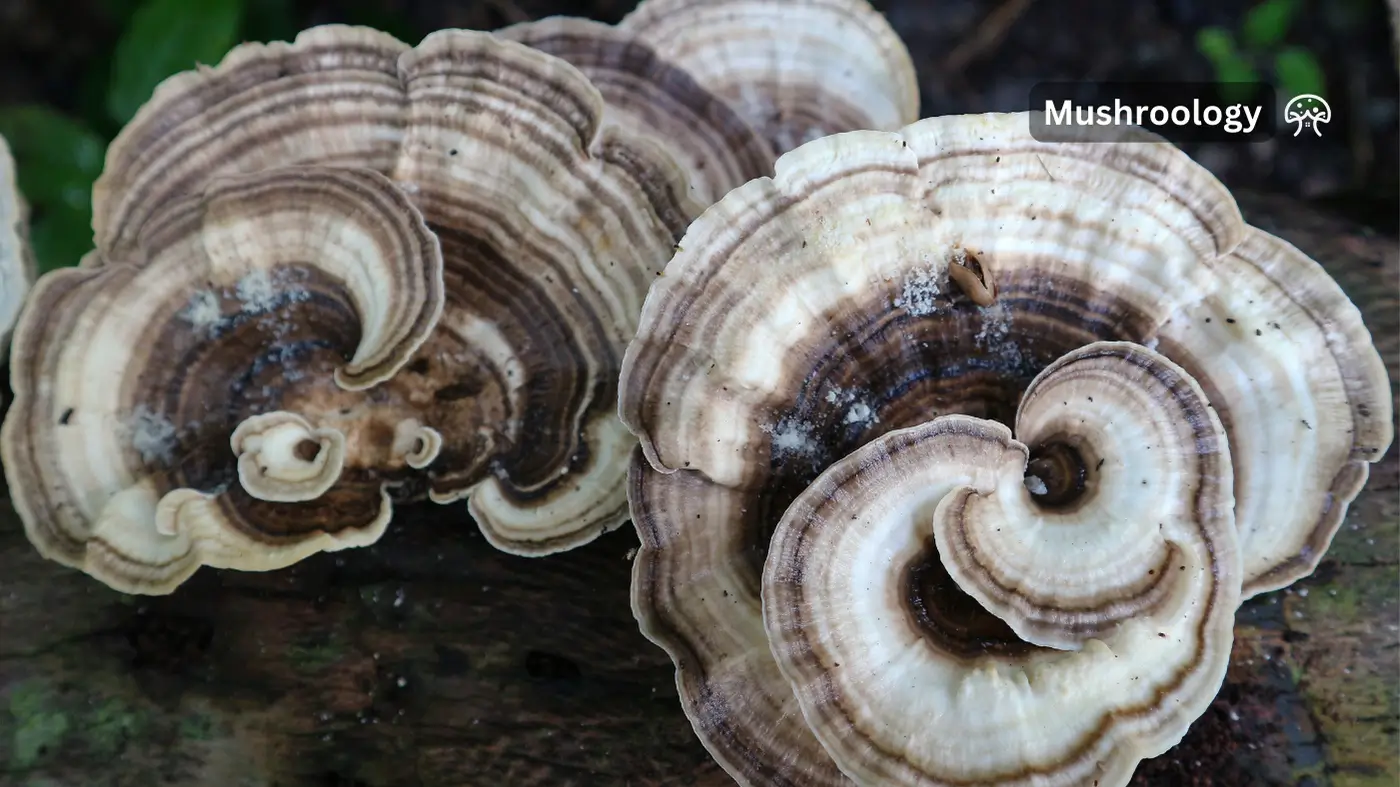
Turkey tail mushroom benefits during pregnancy and breastfeeding
Current safety data doesn’t support Turkey tail use during pregnancy or breastfeeding. Clinical safety reviews note insufficient research to establish safety for pregnant or nursing women.
Pregnancy considerations:
- No established safe dosage for pregnant women
- Immune system changes during pregnancy make effects unpredictable
- Potential interactions with prenatal vitamins or medications
- Risk-benefit analysis favors avoiding use until after breastfeeding
Breastfeeding concerns:
- Unknown whether PSK or PSP compounds pass into breast milk
- Potential effects on nursing infant’s developing immune system
- No clinical trials in breastfeeding mothers
The cautious approach is avoiding Turkey tail supplements during pregnancy and breastfeeding. Focus on proven safe immune support like adequate sleep, nutrition, and stress management instead.
How to use Turkey tail mushroom safely
Turkey tail supplements come in various forms with different concentrations of active compounds. Dosage research from clinical trials provides guidance for safe use.
Proven effective dosages:
- Whole mushroom powder: 2,000-2,500 mg (2-2.5 grams) daily
- PSK extract: 3,000-9,000 mg (3-9 grams) daily in cancer studies
- PSP extract: 1,080-3,600 mg (1.08-3.6 grams) daily for gut health
Safety guidelines:
- Start with small doses to test tolerance
- Take with food to reduce digestive upset
- Choose products from reputable manufacturers with third-party testing
- Store in cool, dry places away from direct sunlight
Quality considerations include looking for standardized extracts that specify PSK or PSP content. The FDA doesn’t regulate supplements like prescription drugs, so product quality varies significantly between manufacturers.
Best time to take Turkey tail mushroom
Clinical studies used various dosing schedules, but consistent daily use shows better results than sporadic supplementation. Research timing suggests:
Optimal timing:
- Morning with breakfast for immune support
- Split doses throughout the day for gut health benefits
- Consistent daily use for 8+ weeks to see measurable effects
- Cycling periods (4 weeks on, 1 week off) for long-term use
Timing to avoid:
- Right before bedtime (may cause mild stimulation)
- During acute illness without medical supervision
- Immediately before or after immunizations (discuss with doctor)
Frequently asked questions about Turkey tail mushroom benefits
Q: How long does it take to see Turkey tail mushroom benefits? A: Research shows gut health improvements within 2-4 weeks, while immune function benefits may take 6-8 weeks of consistent use. Cancer support studies used 6 months to several years of supplementation.
Q: What are the main Turkey tail mushroom benefits for cancer patients? A: Clinical studies show PSK can improve survival rates, immune function, and quality of life when used alongside conventional cancer treatment. It’s approved as prescription medication in Japan for this purpose.
Q: Can Turkey tail mushroom benefits help with autoimmune diseases? A: Turkey tail acts as an immune modulator rather than simply boosting immunity. However, people with autoimmune conditions should consult doctors before use, as it may interfere with immunosuppressive medications.
Q: Are Turkey tail mushroom side effects dangerous? A: Most people tolerate Turkey tail well. Serious side effects are rare but can include allergic reactions in people with mushroom allergies and medication interactions. Always consult healthcare providers before starting.
Q: How do Turkey tail mushroom benefits compare to other medicinal mushrooms? A: Turkey tail has the most extensive clinical research for cancer support, while reishi and lion’s mane have stronger evidence for other conditions. Turkey tail excels specifically in immune modulation and gut health.
Q: Can you get Turkey tail mushroom benefits from eating whole mushrooms? A: Wild Turkey tail mushrooms are too tough and woody to eat. Supplements use extraction methods to concentrate the beneficial PSK and PSP compounds that aren’t available from eating raw mushrooms.
Helpful resources for Turkey tail mushroom information
- National Cancer Institute – Medicinal Mushrooms
- Memorial Sloan Kettering Cancer Center – Coriolus versicolor
- North American Mycological Association (NAMA)
- CancerChoices – Turkey Tail Evidence Review
- Local oncologists and integrative medicine practitioners
Recommended books:
- “Mycelium Running” by Paul Stamets
- “The Fungal Pharmacy” by Robert Rogers
- “Healing Mushrooms” by Tero Isokauppila
Now you understand what current science says about Turkey tail mushroom benefits. You’ll see better results if you choose quality extracts, use appropriate dosages, and work with healthcare providers when using Turkey tail for serious health conditions.

